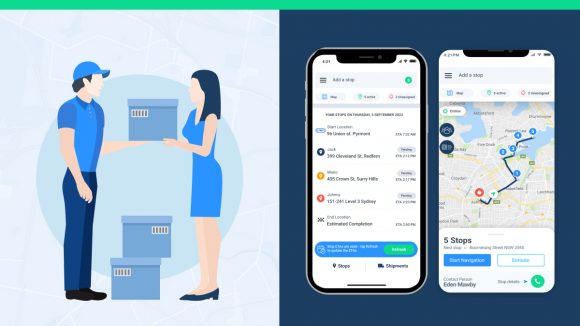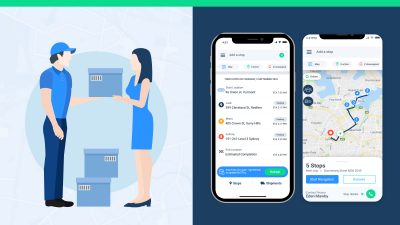Fleet management software is changing how businesses handle their logistics.
Whether coordinating deliveries, tracking driver performance, or optimizing routes, this technology equips fleet managers with real-time insights and tools to streamline operations.
Since efficiency and customer satisfaction are key, investing in fleet management software can make a remarkable difference for businesses of all sizes.
Let’s take a look at what exactly it is, and what it can do for your business.
What is Fleet Management Software?
Fleet management software is a comprehensive solution designed to streamline operations for businesses that manage a fleet of vehicles.
That’s a fancy way to say it’s like having an all-in-one remote control for your vehicles, keeping tabs on where they are, what they’re doing, and making sure everyone’s on time and playing by the rules.
By leveraging technology, this software helps organizations to optimize their routes, track assets in real-time, improve safety, and significantly reduce operational costs.
For companies that rely heavily on transportation, fleet management software is the one tool you can’t do without.
In order to understand how it enhances efficiency and oversight, let’s talk about the core features, benefits, challenges, and trends of fleet management software.
Core Functions of Fleet Management Software
Fleet management software offers a suite of tools that help fleet managers and business owners efficiently oversee and optimize their operations.
Some of these key functionalities include:
1. Asset Tracking:
With asset tracking, you can monitor the location and status of each vehicle, giving managers a complete view of their fleet in real-time.
2. Route Planning:
Enables efficient route design to reduce fuel consumption and travel time.
3. Compliance Management:
Assists in tracking driver hours, vehicle inspections, and other compliance requirements.
4. Driver Behavior Monitoring:
Tracks metrics such as speed, harsh braking, and idle time to improve safety and fuel efficiency.
Benefits of Fleet Management Software
Fleet management software brings substantial advantages to companies that rely on transportation for their operations.
From minimizing costs to boosting operational efficiency, these systems offer a range of features designed to improve productivity and safety while satisfying customer expectations.
Below, we’ll dive into some of the most impactful benefits that businesses can gain by implementing fleet management software.
1. Cost Reduction and Operational Efficiency
One of the most significant benefits of fleet management software is cost reduction.
With tools like route optimization and asset tracking, businesses can cut down on fuel costs, reduce vehicle downtime, and improve resource utilization.
Efficient routing not only saves money but also reduces unnecessary wear and tear on vehicles, contributing to long-term savings.
2. Enhanced Safety and Compliance
Safety is paramount for fleet operations.
Fleet management software can help with this by monitoring driver behavior in real-time and alerting managers to risky driving practices.
This enables coaching and training opportunities for those who might need it.
Additionally, the software tracks compliance with safety regulations to ensure that your fleet meets legal standards and avoids costly fines.
3. Improved Customer Satisfaction
Timely and efficient deliveries are essential to customer satisfaction.
With fleet management software, companies can provide accurate ETAs and real-time tracking for their customers.
This level of transparency builds trust and enhances the customer experience, leading to repeat business and higher customer loyalty.
Key Features of Fleet Management Software
Let’s get to the good part. Key features!
Fleet management software offers a suite of essential tools and features tailored to enhance visibility and control over fleet operations. These features could include everything from live tracking and route optimization to maintenance scheduling.
It allows fleet managers to make informed decisions based on real-time data.
Let’s take a closer look at the core capabilities that set modern fleet management software apart.
1. Real-Time Tracking and Visibility
Fleet management software offers live GPS tracking, allowing businesses to monitor vehicle location and status continuously.
This real-time visibility improves operational oversight, enabling quick adjustments if delays occur.
2. Route Optimization
Route optimization features help fleet managers create the most efficient paths for each delivery.
By reducing travel time and fuel consumption, this feature not only saves costs but also minimizes environmental impact.
3. Maintenance and Asset Management
Fleet management software often includes tools for scheduling regular maintenance and tracking vehicle health.
Proactive maintenance alerts help prevent breakdowns, ensuring that assets remain reliable and functional over time.
4. Data-Driven Insights and Reporting
With data analytics and reporting capabilities, fleet managers can track KPIs, monitor driver performance, and assess operational efficiency.
These insights support informed decision-making, allowing managers to make adjustments that boost productivity and profitability.
Competitors in Fleet Management Software
Make no mistake, the fleet management software market is competitive. There are several providers offering unique solutions for various business needs.
Here’s an overview of some popular software providers and what sets them apart in the industry.
1. Locate2u:
Locate2u Fleet Management Software stands out for its focus on small-to-medium-sized businesses.
The software offers efficient route optimization, live tracking, and seamless integration for businesses looking to improve their fleet management at an affordable price.
With Locate2u, it’s like having a smart sidekick for your fleet – one that doesn’t just track your vehicles but also helps you find the most efficient routes, keeps you updated in real time, and makes your business life a whole lot easier without the big corporate price tag.
2. Verizon Connect:
Verizon Connect supports a wide range of fleet types, from delivery vans to heavy-duty trucks.
3. Samsara:
Samsara provides real-time tracking and AI-driven safety tools, enhancing visibility and security.
4. Onfleet:
Onfleet offers advanced last-mile delivery features, making it popular among e-commerce and food delivery services.
5. ClearPathGPS:
ClearPathGPS offers geofencing and driver monitoring features that are highly beneficial for field service industries.
6. Azuga:
Azuga focuses on driver safety and preventive maintenance, reducing risks and minimizing downtime.
Locate2u Case Study: Patient Transport Services in Queensland
When it comes to real-world applications of fleet management, Locate2u’s software stands out for its adaptability across different industries.
One such example is Patient Transport Services in Queensland.
With a background in ambulance services, Roy, the owner, recognized the need for specialized patient transport that bridged the gap between standard ambulance care and taxi services.
Using Locate2u’s features, such as real-time tracking, job allocation, and e-signature capture, Roy has transformed his operations.
How to Choose the Right Fleet Management Software
Choosing fleet management software is a decision that requires careful consideration.
With many options on the market, businesses need to assess their specific requirements and find a solution that can scale with their growth.
From user-friendly features to integration capabilities, here are some key factors to consider when selecting the best fleet management software for your needs.
1. Assess Your Fleet Needs
Selecting the best starts with assessing your specific needs.
Fleet size, types of vehicles, and the nature of your operations play a major role in determining the right solution.
A delivery service, for example, may prioritize route optimization and real-time tracking, while a field service business may focus more on asset management and maintenance.
2. Look for Scalability and Integration
Remember: As your business grows, so will your fleet and operational demands. It’s essential to choose software that can scale with your business.
Additionally, look for systems that integrate easily with ERP (Enterprise Resource Planning) and WMS (Warehouse Management System) platforms to ensure seamless operations across departments.
3. Prioritize User-Friendly Features and Support
The ease of use of fleet management software is crucial for effective adoption.
You’d want software with an intuitive interface and responsive customer support.
A reliable support team can make a significant difference, especially when implementing new software or troubleshooting issues.
Future Trends in Fleet Management Software
Fleet management is evolving rapidly, driven by advancements in technology.
With innovations like AI, IoT, and the integration of electric and autonomous vehicles, the future holds exciting possibilities for enhanced efficiency and safety.
Here’s what businesses can expect from the next generation of fleet management solutions.
1. AI and Machine Learning
Artificial intelligence (AI) is making noise in the fleet management space by enabling predictive maintenance, advanced route optimization, and proactive safety monitoring.
Machine learning algorithms can analyze historical data to predict vehicle issues before they occur, preventing costly breakdowns and minimizing downtime.
2. Internet of Things (IoT)
The integration of IoT technology provides real-time data from sensors installed in vehicles, offering insights into vehicle performance, cargo conditions, and driver behavior.
This real-time data enhances visibility, enabling fleet managers to make immediate adjustments as needed.
ALSO READ: Smart tech: AI, AR, IoT, and ADAS in modern transit
3. Autonomous and Electric Vehicles
With the rise of electric and autonomous vehicles, fleet management software is evolving to support these new types of fleets.
Integration with electric vehicle (EV) charging stations, battery health monitoring, and autonomous vehicle tracking are some of the features businesses can expect in the future.
Final Takeaways on Fleet Management Software
his type of software is an invaluable asset for businesses with transportation needs since it offers solutions that enhance efficiency, reduce costs, and improve customer satisfaction.
By leveraging features like real-time tracking, route optimization, and data-driven insights, companies can optimize their operations and remain competitive in an increasingly demanding market.
As technology continues to advance, fleet management software will only become more powerful, providing businesses with even greater tools to manage and scale their logistics effectively.
About the author
Cheryl has contributed to various international publications, with a fervor for data and technology. She explores the intersection of emerging tech trends with logistics, focusing on how digital innovations are reshaping industries on a global scale. When she's not dissecting the latest developments in AI-driven innovation and digital solutions, Cheryl can be found gaming, kickboxing, or navigating the novel niches of consumer gadgetry.











